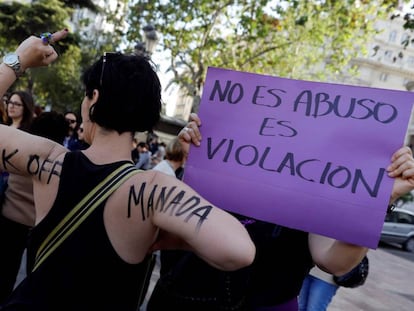La Manada ruling sparks fierce debate over definition of sexual violence
A court¡¯s decision to clear five men of rape in the high-profile ¡°Running of the Bulls¡± case has raised questions about what constitutes intimidation


The victim was maneuvered by five men in the early hours of the morning into the lobby of a residential building. They pulled down her underwear and began to have sex with her. She felt ¡°stunned and unable to react,¡± ¡°intensely overwhelmed and disturbed, which produced shock and made her adopt a passive and submissive attitude, meaning that she did what the accused asked her to do, keeping her eyes closed for most of the time.¡±
Can anyone actually say this context is not intimidating? Criminal law professor Juan Terradillos
In two videos, the 18-year-old appears ¡°shrunken and cornered against the wall by two of the accused,¡± expressing ¡°cries that reflect pain.¡± Other scenes show ¡°the submission and subjugation of the victim to the will of the accused,¡± while one of the men makes ¡°boastful, ostentatious and bragging¡± gestures.
This is what the court in Navarre wrote in its sentence of the gang rape trial of an 18-year-old woman at the 2016 Running of the Bulls festival in Pamplona ¨C a high-profile case, known as La Manada, or The Pack, after the name of the WhatsApp group the men used to chat among themselves and with other friends.
But despite the seemingly damning evidence, the court cleared the men of sexual assault (rape) and sentenced them instead to nine years for sexual abuse. The prosecution had sought 22 years for each defendant on the more serious charge.
Why didn¡¯t the judges find the defendants guilty of rape?
The magistrates agreed that the woman¡¯s consent was compromised but said that there was no violence or intimidation, two necessary requirements for rape under Spanish law.
In its ruling, the court said that according to Supreme Court case law, there can only be violence if physical aggression is used against a victim ¨C an act the judges believe did not occur.
It is very likely that the Supreme Court will revoke the sentence Criminal law professor Manuel Cancio
But this definition of violence has outraged protesters, in Spain who say that women should not have to risk their lives fighting off aggressors in order to prove they were raped. At the mass protests against the controversial verdict, women chanted ¡°They don¡¯t believe us, unless they kills us¡± ¨C a reference to the case of Diana Quer, a Madrid teenager who was killed after she fought off a man who tried to sexually assault her.

On the question of intimidation ¨C the key issue of the case ¨C the court ruled that according to case law it is ¡°psychological duress, consisting of the threat or the announcement of future and real serious harm if the victim does not agree to participate in a determined sexual act.¡± The court agreed that the men had ¡°taken advantage¡± of their superior position to sexually abuse the woman but ruled that this did not constitute intimidation.
Superiority versus intimidation
According to Manuel Cancio, professor of criminal law at the Autonomous University of Madrid, the court¡¯s ruling has misunderstood the difference between intimidation and superiority.
¡°If these men had used their position of superiority to make the woman stay quiet and do what they wanted, there is intimidation. If they haven¡¯t done this, they have to be acquitted. The judges had opted for a very strange middle road that I don¡¯t think is legally correct.¡±
Cancio explains that a position of superiority refers to the influence a boss exerts over their employees or a teacher over a student ¨C situations that clearly do not apply to La Manada case. ¡°I believe that in this case, with the proven facts, there was intimidation, and it is very likely that the Supreme Court will revoke the sentence.¡±
Intimidation versus influence
A Supreme Court ruling in 2005 highlighted that it is difficult to distinguish intimidation from influence because if consent has been forced ¡°the victim to some extent feels intimidated.¡±
In order to define the difference, the ruling said that the ¡°act of intimidation¡± was more important that the ¡°reaction of the victim.¡± In La Manada sentence, the court said the ¡°victim was not capable of explaining what harm she feared would happen, if she had disagreed to take part.¡±
Judges ¡°out of touch with reality¡±
¡°We have to ask for the courts to stay in touch with reality, and not only case law precedents,¡± says Juan Terradillos, criminal law professor at the University of C¨¢diz. ¡°Five men who call themselves ¡®The Pack¡¯ have non-consensual sex ¨C according to the ruling ¨C in the secrecy of a hallway and this does not constitute intimidation? Can anyone actually say this context is not intimidating?¡±
The punishment for sexual abuse with penetration is four to 10 years and for rape it is six and 12 ¨C up to 15 if there are aggravating circumstances. But this case goes beyond the question of prison sentences and to core of what constitutes consent and intimidation in cases of sexual violence.
English version by Melissa Kitson.
Tu suscripci¨®n se est¨¢ usando en otro dispositivo
?Quieres a?adir otro usuario a tu suscripci¨®n?
Si contin¨²as leyendo en este dispositivo, no se podr¨¢ leer en el otro.
FlechaTu suscripci¨®n se est¨¢ usando en otro dispositivo y solo puedes acceder a EL PA?S desde un dispositivo a la vez.
Si quieres compartir tu cuenta, cambia tu suscripci¨®n a la modalidad Premium, as¨ª podr¨¢s a?adir otro usuario. Cada uno acceder¨¢ con su propia cuenta de email, lo que os permitir¨¢ personalizar vuestra experiencia en EL PA?S.
?Tienes una suscripci¨®n de empresa? Accede aqu¨ª para contratar m¨¢s cuentas.
En el caso de no saber qui¨¦n est¨¢ usando tu cuenta, te recomendamos cambiar tu contrase?a aqu¨ª.
Si decides continuar compartiendo tu cuenta, este mensaje se mostrar¨¢ en tu dispositivo y en el de la otra persona que est¨¢ usando tu cuenta de forma indefinida, afectando a tu experiencia de lectura. Puedes consultar aqu¨ª los t¨¦rminos y condiciones de la suscripci¨®n digital.










































